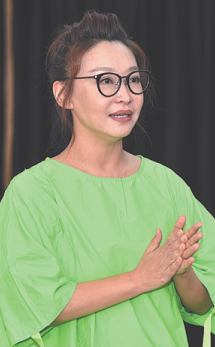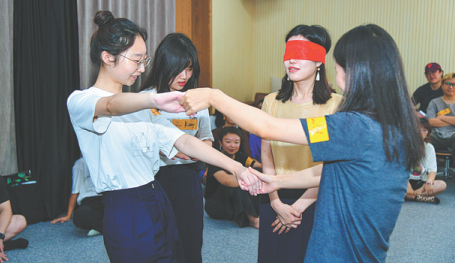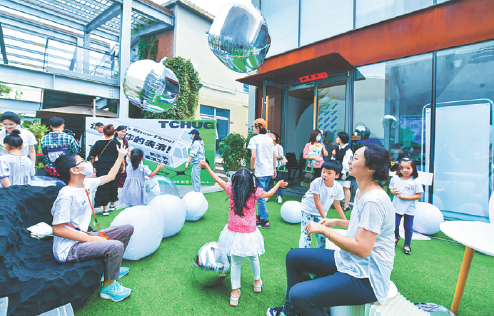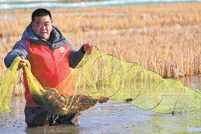LEARNING GAMES
A theater workshop seeks to contribute to children's overall development, Cheng Yuezhu reports.

Actress and educator Liu Tianchi started to teach children theater in 2018 to fulfill a promise she made in 2008 after the deadly earthquake rocked Sichuan province in May that year.
A local primary school principal requested Dongdong Xiezi ("move the shoes"), a Beijing-based nonprofit children's theater troupe, to stage a play in the province on Children's Day in June.
Liu became director of the production. Her team had to pick cast members, adapt a picture book story into a stage play and complete rehearsals in a week. Later they performed in major cities hit by the earthquake.
Along the way, she had in-depth conversations with Li Minghua, head of the troupe, and learned that theater education does not aim to cultivate young talent, but to support children's personal growth, Liu recalls.
"Theatrical methods are utilized as a set of tools in children's education, to help children acquire knowledge and skills, know themselves, support their personal growth and develop a healthy mindset, as well as express their emotions. Because a lot of theatrical methods are like games, they are easier for children to accept," Liu says.
She is now an associate professor at the Central Academy of Drama in Beijing, and runs her own acting workshop, which aims to cultivate new generations of actors and actresses.
The workshop hosted its annual open day in September, with talks and training sessions highlighting the Flying Seeds project that provides acting courses for children.
The project features courses on the 24 solar terms of the Chinese lunar calendar, through which children are guided by teachers to participate in acting exercises and perform creatively based on their everyday observations.
To make learning fun, the teachers strike hand drums and the children are asked to run around, freeze, curl themselves up or jump while shouting loudly.
In one exercise at the recent open day, a dozen children were asked by a teacher to envision themselves as leaves. They assumed postures and had their own interpretations, each different from others.
"My classes mainly comprise three parts-games that help them loosen up and liberate their true nature, dances in which children learn and create with their bodies and minds, and a short stage performance that allows them to express themselves and gain self-confidence," says Er Gu, an instructor at the workshop.
An actor and teacher, he has specialized in theater education for children and joined Liu's workshop "because of their similar educational concepts".
He says: "We have observed that many children and even us, professional theater actors, are so accustomed to verbal communication that we forget our bodily expression, which is the simplest way of expressing ourselves.
"Children's natural ability of bodily expression tends to fade away as a result of limitations set by their surrounding environment and society. We hope that children can rediscover this ability. They can open up, let go and free themselves, and blend in with others in new ways."
Li Li brought her 6-year-old son to the open day because she wanted an unconventional extracurricular activity to emphasize his overall development.
"The workshop is based on theater education but it also incorporates education in picture books, traditional culture and even natural sciences, which I think is very comprehensive," she says.
Her son is a slightly reserved child and slow to warm up to others. Though there is nothing wrong in being an introvert, she says she hopes by attending the acting sessions, her son will be able to open up and communicate well with others when needed.
"I feel theater can help children to develop their minds and express themselves better," she adds.
The open day invited parents to exercise their imagination and perform the activities together with their children.
The workshop runs another project that targets amateur performers, and so far it has covered more than 8,000 participants after having started in 2019.
"When I started with children's theater education, my main aim was to influence generations of teachers. I feel in Chinese society, two groups of people have a major impact on children's future-mothers and teachers, and these two groups sometimes overlap," Liu says.
She says teachers and parents should acquire theatrical knowledge for education and parenting. She gives the example of a woman, who attended an acting course at the workshop with her son.
When the woman and her son got into an argument about doing homework later, she thought of the role-playing exercise they had learned, where parents and children took turns to play the "big tiger and small tiger".
The exercise became an effective way for them to release their negative emotions and communicate with each other as equals, Liu says.
"Everyone is first and foremost a human, and secondly has a social identity. We have gradually let our social identities become predominant while diminishing the part of us that is simply human. Hence, we bear more burden enforced by our social identities, and gradually lose ourselves."
She adds: "Both adults and children should make connections with their inner worlds via drama, rather than enshrining drama in the theaters or on screens.
"Nowadays, the popular ways of entertainment, such as escape rooms, are actually derived from drama, and they are able to bring people closer."
The workshop is also seeking to popularize advanced theater education in middle schools.
"Some schools have been working to create different kinds of environment for their students, whereby textbook knowledge can be truly applied to everyday scenarios," Liu says.



Today's Top News
- China to apply lower import tariff rates to unleash market potential
- China proves to be active and reliable mediator
- Three-party talks help to restore peace
- Huangyan coral reefs healthy, says report
- PLA conducts major drill near Taiwan
- Washington should realize its interference in Taiwan question is a recipe it won't want to eat: China Daily editorial






























